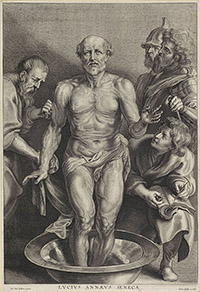Seneca the Younger
| Lucius Annaeus Seneca, popularly known as Seneca the Younger
(c. 4 BC – 65 AD), was a Roman Stoic philosopher, statesman, and playwright. He
was a tutor and advisor to the emperor Nero, and his writings were widely read
in the ancient world. Seneca's philosophy emphasized the importance of
self-control and the rejection of excessive emotion as a guide to leading a
virtuous life. He also wrote about the importance of living in harmony with
nature and being content with one's circumstances. He was exiled by the emperor
Claudius but later was recalled to serve as a tutor of Nero. He played a key
role in the first years of Nero's rule but later fell out of favor and was
ordered by Nero to commit suicide. Seneca's works include moral essays, plays,
and letters, many of which are still widely read today. He was an influential
figure in the development of both Stoicism and the Renaissance and a had a
great influence on Christianity. |
On the Shortness of Life
In the treatise “On the Shortness of Life”, Roman philosopher Seneca the Younger argues that life is..
$7.99


